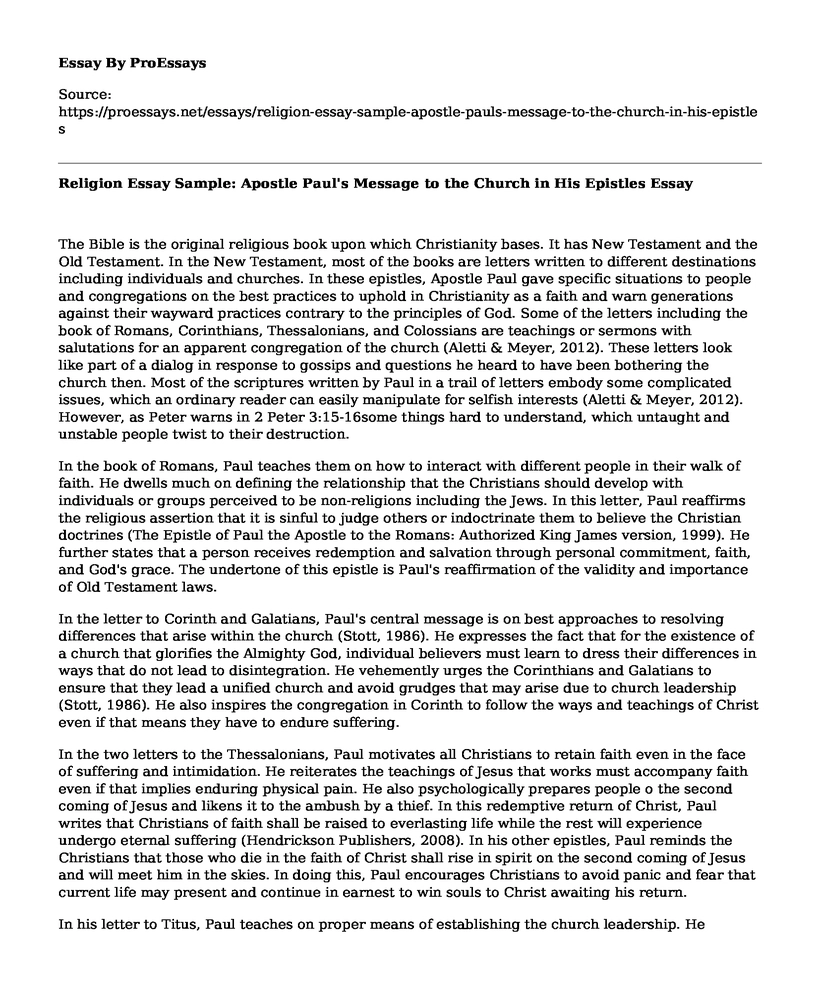The Bible is the original religious book upon which Christianity bases. It has New Testament and the Old Testament. In the New Testament, most of the books are letters written to different destinations including individuals and churches. In these epistles, Apostle Paul gave specific situations to people and congregations on the best practices to uphold in Christianity as a faith and warn generations against their wayward practices contrary to the principles of God. Some of the letters including the book of Romans, Corinthians, Thessalonians, and Colossians are teachings or sermons with salutations for an apparent congregation of the church (Aletti & Meyer, 2012). These letters look like part of a dialog in response to gossips and questions he heard to have been bothering the church then. Most of the scriptures written by Paul in a trail of letters embody some complicated issues, which an ordinary reader can easily manipulate for selfish interests (Aletti & Meyer, 2012). However, as Peter warns in 2 Peter 3:15-16some things hard to understand, which untaught and unstable people twist to their destruction.
In the book of Romans, Paul teaches them on how to interact with different people in their walk of faith. He dwells much on defining the relationship that the Christians should develop with individuals or groups perceived to be non-religions including the Jews. In this letter, Paul reaffirms the religious assertion that it is sinful to judge others or indoctrinate them to believe the Christian doctrines (The Epistle of Paul the Apostle to the Romans: Authorized King James version, 1999). He further states that a person receives redemption and salvation through personal commitment, faith, and God's grace. The undertone of this epistle is Paul's reaffirmation of the validity and importance of Old Testament laws.
In the letter to Corinth and Galatians, Paul's central message is on best approaches to resolving differences that arise within the church (Stott, 1986). He expresses the fact that for the existence of a church that glorifies the Almighty God, individual believers must learn to dress their differences in ways that do not lead to disintegration. He vehemently urges the Corinthians and Galatians to ensure that they lead a unified church and avoid grudges that may arise due to church leadership (Stott, 1986). He also inspires the congregation in Corinth to follow the ways and teachings of Christ even if that means they have to endure suffering.
In the two letters to the Thessalonians, Paul motivates all Christians to retain faith even in the face of suffering and intimidation. He reiterates the teachings of Jesus that works must accompany faith even if that implies enduring physical pain. He also psychologically prepares people o the second coming of Jesus and likens it to the ambush by a thief. In this redemptive return of Christ, Paul writes that Christians of faith shall be raised to everlasting life while the rest will experience undergo eternal suffering (Hendrickson Publishers, 2008). In his other epistles, Paul reminds the Christians that those who die in the faith of Christ shall rise in spirit on the second coming of Jesus and will meet him in the skies. In doing this, Paul encourages Christians to avoid panic and fear that current life may present and continue in earnest to win souls to Christ awaiting his return.
In his letter to Titus, Paul teaches on proper means of establishing the church leadership. He encourages the church bishop to take a central responsibility of teaching things that are not only right but also correct. He underscores his teaching by affirming the significance of proper leadership by asking them to embrace salvation, which brings richness and fullness. By assuring the congregation of satisfaction derived from salvation, Paul discourages church leaders and members from engaging in supremacy wars at the expense of the word. In the epistle to Titus, Paul says that through the Holy Spirit and regeneration, God offers fulfilling salvation.
References
Aletti, J.-N., & Meyer, P. M. (2012). New approaches for interpreting the letters of Saint Paul: Collected essays, rhetoric, Soteriology, Christology and ecclesiology. Rome: Gregorian and Biblical Press.
Hendrickson Publishers. (2008). the Holy Bible: King James Version. Peabody, Mass: Hendrickson Publishers
Stott, J. R. W. (1986). The message of Galatians: Only one way. Leicester, England; Downer's Grove, Ill., U.S.A. : Inter-Varsity Press,
The epistle of Paul the Apostle to the Romans: Authorized King James version. (1999). Edinburgh: Canongate.
Cite this page
Religion Essay Sample: Apostle Paul's Message to the Church in His Epistles. (2021, Apr 02). Retrieved from https://proessays.net/essays/religion-essay-sample-apostle-pauls-message-to-the-church-in-his-epistles
If you are the original author of this essay and no longer wish to have it published on the ProEssays website, please click below to request its removal:
- Case Study: Healing and Autonomy
- Ancient China and India Religion Essay
- Current News Story That Relates to the Old Testament - Essay Sample
- Essay Sample on The Baptism of Jesus: A Significant Event in Christianity
- Hinduism: Ancient Religion of India & Asia's Eternal Way - Essay Sample
- Essay Sample on Shepherds: Unfaithful, Irresponsible, and Unaccountable
- Essay Example on Christians: Not All Are Judgmental







